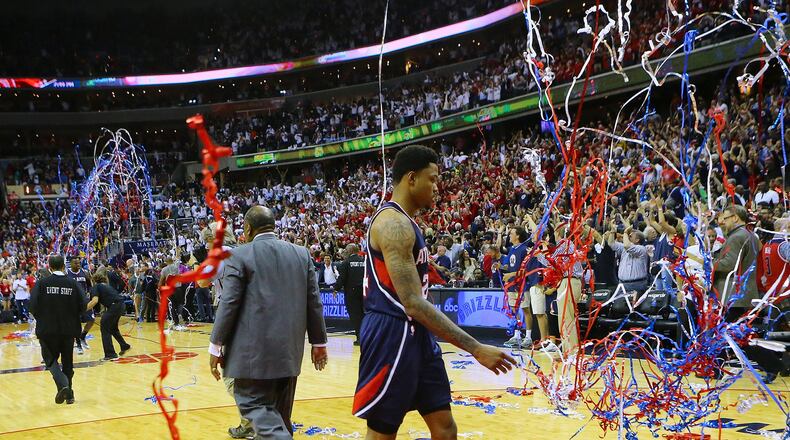Al Horford said effort wasn’t a problem. Paul Millsap said it absolutely was. DeMarre Carroll said that, owing to John Wall’s absence, the Hawks “took our foot off the gas and thought we just had to show up.” Thus was the bizarre Game 3 lost, but what’s happening with this team is bigger than Game 3.
With the exception of the closeout Game 6 in Brooklyn, the Hawks have spent this postseason looking ordinary. Midway through Saturday’s second quarter, the thought occurred: If you didn’t know that this was the East’s No. 1 seed, you’d never have guessed from its playoff performance.
Said Millsap: “We haven’t been ourselves.”
Said coach Mike Budenholzer: “I don’t think we have been ourselves for 48 minutes.”
There have been snippets. The Hawks’ bench — the bench Budenholzer didn’t trust in the fourth quarter of Game 5 in a tied Round 1 — overrode a 21-point fourth-quarter deficit and nearly won a game the regulars — the five men who were named the Eastern Conference’s player of the month for January — had botched. But which part of Game 3 mattered more: The astonishing comeback or the just-as-astonishing ineptitude/indifference?
Much of Budenholzer’s media session Sunday after practice at George Washington University centered on Carroll. Having reinserted the man the coach conceded was “our best wing defender” for the 1.7 seconds it took the Hawks to foul Will Bynum, why was Carroll not on the floor for the final seconds, when the 38-year-old Paul Pierce — a wing, don’t you know — banked home the winner over the smaller Dennis Schroder?
Carroll: “We discussed it. We both felt it was better to go with the group we had.”
Carroll was asked if, in retrospect, he should have lobbied harder to go back in the game. The response: “No comment.”
Budenholzer’s rationale for keeping Carroll on the bench over the final 14.1 seconds: “(He) hadn’t played the whole fourth quarter.” Actually he’d played the 1.7 seconds, if you can call that playing, from 23.8 to 22.1. Why once but not twice?
Budenholzer: “We went with the group that gave us the best chance to get a stop.”
The intent isn’t to second-guess a non-substitution but to underscore the following: This smooth-running team has hit such turbulence that the NBA coach of the year had to risk losing a suddenly winnable game to make a point. At this late date, how could the Hawks not have absorbed what Budenholzer was trying to teach?
As Millsap averred, the Hawks have become something other than the Hawks. Of the eight teams still playing, the Hawks rank last in postseason field-goal percentage. They’ve been outshot by Brooklyn and Washington by 43.6 percent to 43.3. If that doesn’t sound like a big deal, consider: Over a 60-win regular season, the Hawks made 46.6 percent of their shots; their opponents made 43.9.
Over nine playoff games, opponents have shot slightly better, while the Hawks have been much worse. The pace-and-space offense has become chuck-and-duck. The great shooter Kyle Korver took three shots over the first 45 minutes of Game 3, the first two coming off offensive rebounds.
“We need him to be aggressive,” Budenholzer said, and it’s clear that running Korver off the 3-point line is a point of emphasis for every defense. “But if the opponent is going to make it a four-on-four game, there should be room for other people.”
But if the great shooter doesn’t get and make shots — Korver is averaging 9.3 points over the four playoff losses — do the Hawks cease with the jump shots? On the contrary. They’ve tried 47 more treys than any other club in these playoffs. Of their postseason shots, 35.5 percent have been 3-pointers; over the regular season; 32.1 percent were treys. Their percentage of 3-point makes has dipped from 38.0 to 35.3.
In sum, they’re taking more long jumpers to less effect. Having watched the Game 3 tape, Carroll said that the Hawks’ halting start came because “the first five possessions we chucked up 3s.” (That was an exaggeration, but the game’s first shot was a missed trey from Pero Antic, in because Millsap was ill.)
The offense, which skews toward the 3-pointer in the best of times, needs to be brought closer to plumb. The part about playing hard, though, isn’t a function of style. It should be a given. Said Carroll: “If you’re an Atlanta Hawk and you don’t come out with a sense of urgency for the next game, you’re not an Atlanta Hawk.”
Right about now, the world wants to know: What is an Atlanta Hawk? Is this still the East’s finest team, or has it grown so soft that it can be overpowered by a No. 5 seed missing its best player Carroll again: “My dad keeps saying we can’t be content to think we’re the No. 1 seed; we have to act like we’re the No. 1 seed. We haven’t acted like that this whole series.”
It’s time to start. If Game 4 isn’t won, the best band of Hawks in franchise history will be perched on the lip of extinction.
About the Author
Keep Reading
The Latest
Featured


